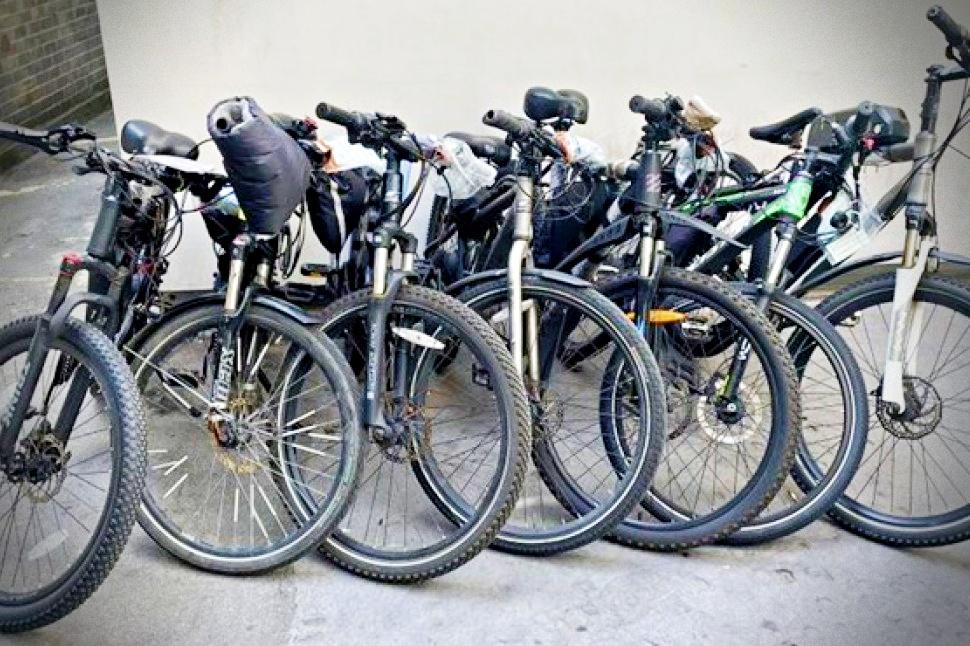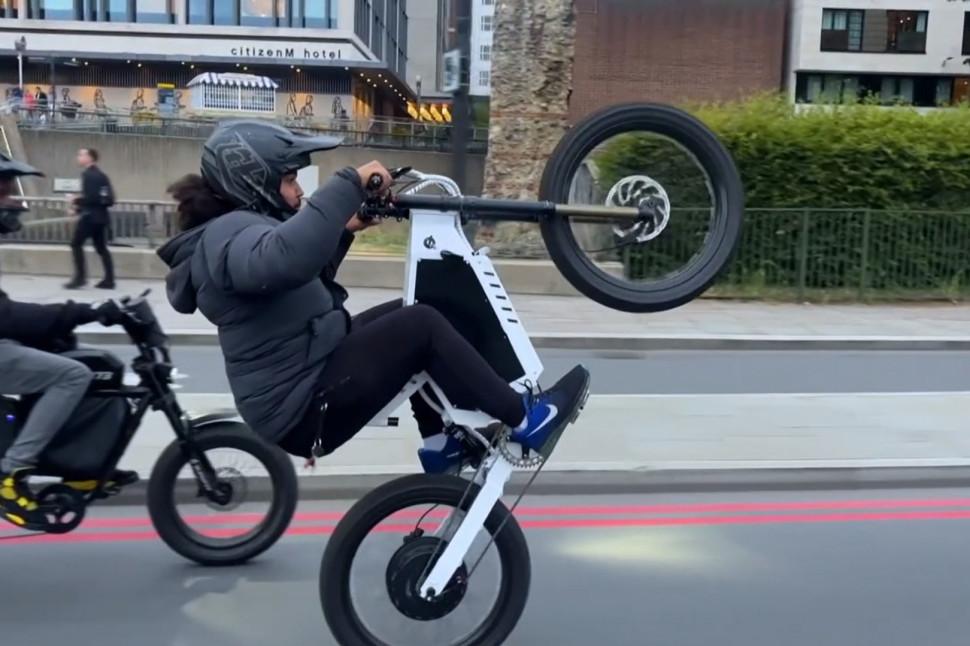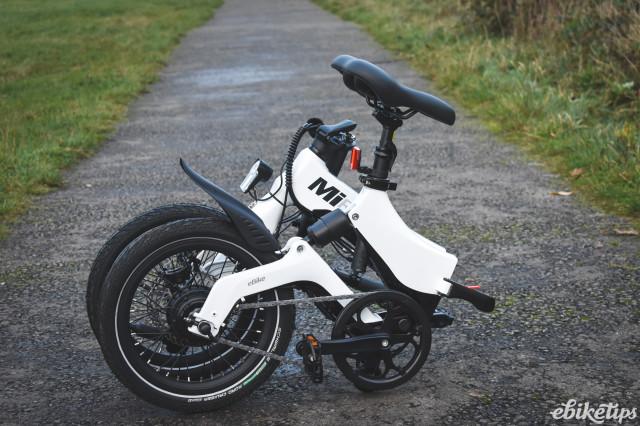- News
- Reviews
- Bikes
- Components
- Bar tape & grips
- Bottom brackets
- Brake & gear cables
- Brake & STI levers
- Brake pads & spares
- Brakes
- Cassettes & freewheels
- Chains
- Chainsets & chainrings
- Derailleurs - front
- Derailleurs - rear
- Forks
- Gear levers & shifters
- Groupsets
- Handlebars & extensions
- Headsets
- Hubs
- Inner tubes
- Pedals
- Quick releases & skewers
- Saddles
- Seatposts
- Stems
- Wheels
- Tyres
- Tubeless valves
- Accessories
- Accessories - misc
- Computer mounts
- Bags
- Bar ends
- Bike bags & cases
- Bottle cages
- Bottles
- Cameras
- Car racks
- Child seats
- Computers
- Glasses
- GPS units
- Helmets
- Lights - front
- Lights - rear
- Lights - sets
- Locks
- Mirrors
- Mudguards
- Racks
- Pumps & CO2 inflators
- Puncture kits
- Reflectives
- Smart watches
- Stands and racks
- Trailers
- Clothing
- Health, fitness and nutrition
- Tools and workshop
- Miscellaneous
- Buyers Guides
- Features
- Forum
- Recommends
- Podcast
news
 Confiscated e-bikes (credit: City of London Police)
Confiscated e-bikes (credit: City of London Police)“A huge setback for active travel”: Non-foldable e-bikes to be banned from most Transport for London services to “ensure safety of customers and staff”
Non-foldable e-bikes are set to be banned across most of London’s transport networks operated by Transport for London (TfL) services from 31 March to “ensure the safety of customers and staff”, the city’s local government body has announced today.
The ban is set to be enforced with the help of TfL’s 450 uniformed officers deployed across the capital’s public transport network. Cyclists who do not comply can be refused entry, asked to leave, or slapped with a fine of up to £1,000.
The news comes after an e-bike exploded and caught fire at Rayners Lane station platform last month, and another burst into flames on a platform at Sutton railway station last March.
Following last month’s incident, Aslef, the train drivers’ union, had threatened strike action unless TfL banned e-bikes from the London Underground, with the RMT and the TSSA also calling for similar bans.
TfL said that it has “worked closely with the London Fire Brigade and other partners to carry out a comprehensive review of the safety of e-bikes and their suitability for carriage on the TfL transport network”.
“While the majority of e-bikes are safe, there have been a small number of incidents where non-foldable e-bikes have caught fire on the transport system in London,” TfL said. “To ensure the safety of the network for customers and staff, customers in possession of non-foldable e-bikes will not be permitted to travel on most TfL services, including on the Tube, Overground, Elizabeth line and DLR.
“The ban includes all non-folding e-bikes, including standard cycles that have been converted to e-bikes using conversion kits.”
> E-scooters banned from public transport in London and Newcastle due to fire risk
According to TfL’s analysis, adapted bikes using electronic conversion kits posed a greater fire risk than purpose-built e-bikes, although it pointed it could be hard to differentiate between modified and unmodified e-bikes.
It said it was instigating the ban “until improved product safety measures are in place for converted cycles, batteries and chargers”.
The operator, which becomes the first in the UK to impose such a ban, added it recognises the “important role of e-bikes” for Londoners and “will keep these changes under review, pending any future measures to improve product safety by the Government regarding e-bike safety standards”.
Important update on e-bikes on TFL services: The safety of Londoners is my top priority, and while most e-bikes are safe, there have been a small number of incidents where non-foldable e-bikes have caught fire on the transport system, which has caused me great concern. (1/3)
— Mayor of London, Sadiq Khan (@london.gov.uk) 26 March 2025 at 15:30
Sadiq Khan, Mayor of London, said: “The safety of Londoners is my top priority and, while most e-bikes are safe, there have been a small number of incidents where non-foldable e-bikes have caught fire on the transport system, which have caused me great concern.
“This is why, following a comprehensive review of the safety of e-bikes, TfL is banning all non-folding e-bikes on tube and rail services. I have asked TfL to continue to work with Government and partners to improve e-bike safety as we build a safer London for everyone.”
Commenting on the news, James Metcalfe, co-founder of Volt Bikes said: “While we’re pleased this isn’t an outright ban of all e-bikes, the blanket ban of all non-folded e-bikes in the TfL network is a huge setback for active and sustainable transport in London. Many ordinary commuters who cycle to and from their tube/train stations will now be unable to make their usual journeys. Instead of restricting access for most users who own safe, legal e-bikes, the emphasis should be placed on education and enforcement, rather than a one-size-fits-all approach.
“The heart of the issue isn’t that folding e-bikes are safer, it’s that manufacturers, like us at Volt, uphold strict quality standards and only use cells from trusted brands like Panasonic, but the same can’t always be said for the e-bikes, batteries, and conversion kits being bought online.”
He added that Volt's folding e-bikes use the same batteries as its non-folding models, and there was a need to make the public more aware of the potential dangers associated with buying from non-reputable brands.
“If TfL and the government are serious about promoting sustainable transport, then we need policies that encourage cycling by connecting it with public transport, rather than deterring people from it,” he concluded.
Lilli Matson, TfL’s Chief Safety, Health and Environment Officer, said: "Our priority is always the safety of our customers and colleagues. We have been working closely with the London Fire Brigade on a review of the safety risks associated with e-bikes on our network and following this review, we will be putting this safety ban in place from 31 March 2025.
“Customers with non-foldable e-bikes will not be permitted to use our tube and rail services. This safety ban will play a vital role in keeping our transport system safe for everyone, and we continue to work with partners in government and beyond to improve e-bike safety.”
Charlie Pugsley, London Fire Brigade Deputy Commissioner for Prevention, Protection & Policy, said: “We welcome this move by Transport for London following their detailed safety review, as it acknowledges the risks that we know e-bike batteries can pose.
“While we recognise the sustainable benefits e-bikes, and micromobility generally, bring to our city, the reality is that across London we have been seeing an e-bike or e-scooter fire every other day, on average, and we have particular concern about the risk posed by conversion kits or modified e-bikes. When these fires occur, they can be sudden, incredibly ferocious and produce smoke that is extremely toxic.”
Lesley Rudd, chief executive of Electrical Safety First, also responded to the news, saying that the e-bike industry could be set for future blanket restrictions if “substandard versions of e-bikes, their batteries, chargers and conversion kits coming onto the market” are not regulated.
She said: “Whilst reputable manufacturers produce high quality products that meet safety standards, more needs to be done to address the risk posed by substandard versions of these devices that are often linked to serious incidents.
“It’s vital the Product Regulation and Metrology Bill tackles this issue head on and mandates third-party certification for these products, to ensure only safe batteries and e-bikes can be sold on the UK market. Converted e-bikes can also pose a risk if they are made up of substandard or incompatible components, and converted incorrectly, which is why we are also calling for new safety standards to be introduced for these kits, to better tackle the issue.
“Our proposals will better protect consumers, protect the reputable sector who already make safe devices, and help to weed out bad operators producing and selling dangerous substandard batteries.”
road.cc has asked TfL to comment on the finer points of why it deems folding e-bikes safer than non-folding bikes, and how enforcement officers will be trained to differentiate between more discreet models of electric bike and regular pedal assist bikes.
Adwitiya joined road.cc in 2023 as a news writer after completing his masters in journalism from Cardiff University. His dissertation focused on active travel, which soon threw him into the deep end of covering everything related to the two-wheeled tool, and now cycling is as big a part of his life as guitars and football. He has previously covered local and national politics for Voice Cymru, and also likes to write about science, tech and the environment, if he can find the time. Living right next to the Taff trail in the Welsh capital, you can find him trying to tackle the brutal climbs in the valleys.
Latest Comments
- AidanR 1 hour 32 min ago
I came off my bike just before Christmas and broke my femur. The care was excellent and I'm back on the bike, albeit with more rehab to be done.
- mdavidford 1 hour 48 min ago
Untitled, or entitled? I bet it speeds down towpaths and weaves in and out of boats, and it's definitely not wearing a helmet or hi vis.
- Oldfatgit 2 hours 52 min ago
Are these actually 'hi-viz' - or just brights?...
- Bungle_52 2 hours 53 min ago
That one was completely different though, it was a driver not a car as in the other 3. So 1 in 4 of the stories manage to follow reporting guidelines.
- Rendel Harris 4 hours 46 min ago
Absolutely they could have. Tarmac is a petroleum-based product and its surface can be very oily when it's newly laid. This is particularly the...
- ROOTminus1 10 hours 48 min ago
I'm glad the article went into more detail and cleared things up, the headline had me worried that some autonomous building had run rampant and...
- mark1a 11 hours 6 min ago
Still here, just showing a few signs of wear and tear. Hopefully still serviceable for some years to come.
- Rendel Harris 11 hours 51 min ago
How can you know that you are "equally fearful" as "any female cyclist"? There is no possible way of quantifying such emotions and female cyclists...
- chrisonabike 12 hours 23 min ago
I think it would be fairer to blame the moon - as in "my client is a loony".
- Bungle_52 12 hours 46 min ago
Nice idea but Gloucestershire Constabulary are not interested as exemplified by this prvious NMOTD. Not only was there NFA for the close pass in...



Add new comment
34 comments
Every bike is foldable many times - at the head tube.
The question is whether you can unfold it?
Seconded. It seems odd to state that folding e-bikes are allowed, as if that hinge is all the protection needed (no matter how much duct tape is on there…).
It's simply that folding bikes are least likely to be DIY battery jobs, and that the DIY battery jobs are the most likely to catch fire.
Also non foldable bikes are restricted at certain times on parts of the network, when folded are still permitted It seems a reasonable line to draw.
The unions were prepared to strike on this issue so what else are TfL supposed to do ? No one wants to see another King's Cross happen on their watch
Pages